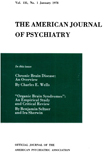THE USE OF ANTABUSE (TETRAETHYLTHIURAMIDISULPHIDE) IN CHRONIC ALCOHOLICS
Abstract
1. Fourteen of 21 cases treated with Antabuse abstained from alcohol for periods of 2 to 4 months. Twenty-one cases represent too small a group from which to draw many general conclusions. However, the drug appears to have value in the treatment of chronic alcoholism but it has to be given under controlled conditions and in conjunction with psychotherapy. It appears to be more effective than other drug or conditioned reflex therapies used previously.
2. Further coordinate research including internal medical, pharmacologic, psychologic, and social service studies in conjunction with the psychiatric observations are indicated on a greater number of cases to establish the value of the drug. Furthermore, the patients should be studied over a longer period of time, i. e., about a year, to determine the permanency of their abstinence.
3. Under controlled conditions no severe untoward effects were noted.
Access content
To read the fulltext, please use one of the options below to sign in or purchase access.- Personal login
- Institutional Login
- Sign in via OpenAthens
- Register for access
-
Please login/register if you wish to pair your device and check access availability.
Not a subscriber?
PsychiatryOnline subscription options offer access to the DSM-5 library, books, journals, CME, and patient resources. This all-in-one virtual library provides psychiatrists and mental health professionals with key resources for diagnosis, treatment, research, and professional development.
Need more help? PsychiatryOnline Customer Service may be reached by emailing [email protected] or by calling 800-368-5777 (in the U.S.) or 703-907-7322 (outside the U.S.).



